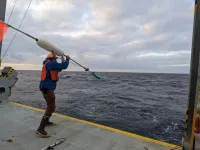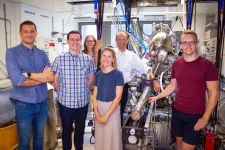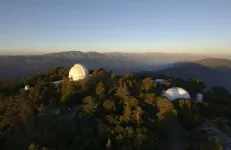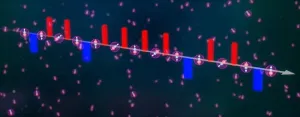(Press-News.org) State-level bans on commercial organic waste disposal have largely failed to reduce landfilled waste across the U.S., with one state standing out as the lone success, according to a new study. Massachusetts alone achieved a significant reduction in landfilled waste when it implemented food waste bans. The findings underscore the importance of well-designed and enforced policies, with Massachusetts offering a potential model for effective waste management. “Our study shows that food waste bans are far from guaranteed to be successful,” the authors note, “but there is potential for them to succeed when composting infrastructure is sufficient and bans are enforced.” Food waste, responsible for nearly half of greenhouse gas emissions from the global food system, produces significant methane emissions in landfills. While food waste and loss cannot be eliminated, their emissions can be reduced. For example, composting can reduce methane emissions by 38 to 84% compared to landfilling. In the United States, 9 states have enacted food waste bans. Although policymakers have touted their potential to divert 10 to 15% of waste from landfills, the effectiveness of food waste bans remains largely unassessed. To measure the impact of these bans, Fiorentia Anglou and colleagues analyzed waste data from 36 U.S. states over 24 years, focusing on 27 states with complete data between 2006 and 2018. They compared the first 5 to implement state-wide food waste bans (California, Connecticut, Massachusetts, Rhode Island, and Vermont) to states without bans. Contrary to the expectations, Anglou et al. found no significant reduction in waste disposal – except in Massachusetts. In California, Connecticut, Vermont, and Rhode Island, waste levels remained largely unchanged after the bans. Massachusetts, however, ultimately achieved a 13.2% reduction in waste. Additionally, the authors observed a 25.7% decrease in methane emissions per ton of waste disposal. The study attributes Massachusetts' success to affordable compliance through accessible composting facilities, simple and consistent regulations, and stricter enforcement. Other states struggled with these aspects, leading to less effective bans.
END
US food waste bans fail to reduce landfill waste, except in Massachusetts
Summary author: Walter Beckwith
2024-09-12
ELSE PRESS RELEASES FROM THIS DATE:
Greenland landslide-induced tsunami produced global seismic signal that lasted 9 days
2024-09-12
In 2023, a massive rockslide in East Greenland, driven by glacial melt, triggered a towering tsunami and a rare global seismic signal that resonated for nine days, according to a new study. The study provides insights into how climate change-induced events like glacial thinning can lead to significant geophysical phenomena with impacts extending throughout the Earth system. Due to climate change, steep slopes are increasingly vulnerable to landslides. In Arctic regions – which are undergoing the most rapid warming globally ...
Climate change-triggered landslide unleashes a 650-foot mega-tsunami
2024-09-12
In September 2023, scientists around the world detected a mysterious seismic signal that lasted for nine straight days. An international team of scientists, including seismologists Alice Gabriel and Carl Ebeling of UC San Diego’s Scripps Institution of Oceanography came together to solve the mystery.
A new study published today in Science provides the stunning solution: In an East Greenland fjord, a mountaintop collapsed into the sea and triggered a mega-tsunami about 200 meters (650 feet) tall. The giant ...
New study reveals food waste bans ineffective in reducing landfill waste, except in Massachusetts
2024-09-12
Of the first five U.S. states to implement food waste bans, only Massachusetts was successful at diverting waste away from landfills and incinerators, according to a new study from the University of California Rady School of Management.
The paper, published today in Science, suggests a need to reevaluate current strategies, citing Massachusetts' approach as a benchmark for effective policy implementation.
Between 2014 and 2024, nine U.S. states made it unlawful for commercial waste generators—such as grocery chains—to dispose of their food waste in landfills, expecting a 10–15% waste reduction.
“We ...
New research reveals how El Nino caused the greatest ever mass extinction
2024-09-12
Mega ocean warming El Niño events were key in driving the largest extinction of life on planet Earth some 252 million years ago, according to new research.
The study, published today in Science and co-led by the University of Bristol and China University of Geosciences (Wuhan), has shed new light on why the effects of rapid climate change in the Permian-Triassic warming were so devastating for all forms of life in the sea and on land.
Scientists have long linked this mass extinction to vast volcanic eruptions in what is now Siberia. The resulting carbon dioxide emissions rapidly accelerated climate warming, resulting in widespread stagnation and the collapse ...
Climate-change-triggered landslide caused Earth to vibrate for nine days
2024-09-12
A landslide in a remote part of Greenland caused a mega-tsunami that sloshed back and forth across a fjord for nine days, generating vibrations throughout Earth, according to a new study involving UCL researchers.
The study, published in the journal Science, concluded that this movement of water was the cause of a mysterious, global seismic signal that lasted for nine days and puzzled seismologists in September 2023.
The initial event, not observed by human eye, was the collapse of a 1.2km-high mountain peak into the remote Dickson Fjord beneath, causing a backsplash of water 200 metres in the air, with a wave up to 110 metres high. This ...
Microbe dietary preferences influence the effectiveness of carbon sequestration in the deep ocean
2024-09-12
Woods Hole, Mass. (September 13, 2024) - The movement of carbon dioxide (CO2) from the surface of the ocean, where it is in active contact with the atmosphere, to the deep ocean, where it can be sequestered away for decades, centuries, or longer, depends on a number of seemingly small processes.
One of these key microscale processes is the dietary preferences of bacteria that feed on organic molecules called lipids, according to a journal article, "Microbial dietary preference and interactions affect the export of lipids to the deep ocean," published in Science.
"In ...
The insulator unraveled
2024-09-12
Aluminum oxide (Al2O3), also known as alumina, corundum, sapphire, or ruby, is one of the best insulators used in a wide range of applications: in electronic components, as a support material for catalysts, or as a chemically resistant ceramic, to name a few. Knowledge of the precise arrangement of the surface atoms is key to understanding how chemical reactions occur on this material, such as those in catalytic processes. Atoms inside the material follow a fixed arrangement, giving rise to the characteristic shapes ...
$3.5M grant to Georgia State will fuel space research across the globe
2024-09-12
ATLANTA — A new three-year, $3.5 million grant from the U.S. National Science Foundation will foster new research at Georgia State’s Center for High Angular Resolution Astronomy (CHARA) Array by astronomers from around the world.
The grant will fund open-access time at the CHARA Array through the NSF National Optical-Infrared Astronomy Research Laboratory (NSF NOIRLab). The program offers astronomers the opportunity to apply for observing time at the CHARA Array to investigate all kinds of objects ...
Polar molecules dance to the tunes of microwaves
2024-09-12
The interactions between quantum spins underlie some of the universe’s most interesting phenomena, such as superconductors and magnets. However, physicists have difficulty engineering controllable systems in the lab that replicate these interactions.
Now, in a recently published Nature paper, JILA and NIST Fellow and University of Colorado Boulder Physics Professor Jun Ye and his team, along with collaborators in Mikhail Lukin’s group at Harvard University, used periodic microwave pulses in a process known as Floquet engineering, to tune interactions between ultracold potassium-rubidium molecules in a system appropriate for studying fundamental magnetic ...
Quantum researchers cause controlled ‘wobble’ in the nucleus of a single atom
2024-09-12
Researchers from Delft University of Technology in The Netherlands have been able to initiate a controlled movement in the very heart of an atom. They caused the atomic nucleus to interact with one of the electrons in the outermost shells of the atom. This electron could be manipulated and read out through the needle of a scanning tunneling microscope. The research, published in Nature Communications today, offers prospects for storing quantum information inside the nucleus, where it is safe from external disturbances.
For weeks on end, the researchers studied a single titanium atom. “A Ti-47 atom, to be precise,” ...
LAST 30 PRESS RELEASES:
This ancient plant-eater had a twisted jaw and sideways-facing teeth
Jackdaw chicks listen to adults to learn about predators
Toxic algal bloom has taken a heavy toll on mental health
Beyond silicon: SKKU team presents Indium Selenide roadmap for ultra-low-power AI and quantum computing
Sugar comforts newborn babies during painful procedures
Pollen exposure linked to poorer exam results taken at the end of secondary school
7 hours 18 mins may be optimal sleep length for avoiding type 2 diabetes precursor
Around 6 deaths a year linked to clubbing in the UK
Children’s development set back years by Covid lockdowns, study reveals
Four decades of data give unique insight into the Sun’s inner life
Urban trees can absorb more CO₂ than cars emit during summer
Fund for Science and Technology awards $15 million to Scripps Oceanography
New NIH grant advances Lupus protein research
New farm-scale biochar system could cut agricultural emissions by 75 percent while removing carbon from the atmosphere
From herbal waste to high performance clean water material: Turning traditional medicine residues into powerful biochar
New sulfur-iron biochar shows powerful ability to lock up arsenic and cadmium in contaminated soils
AI-driven chart review accurately identifies potential rare disease trial participants in new study
Paleontologist Stephen Chester and colleagues reveal new clues about early primate evolution
UF research finds a gentler way to treat aggressive gum disease
Strong alcohol policy could reduce cancer in Canada
Air pollution from wildfires linked to higher rate of stroke
Tiny flows, big insights: microfluidics system boosts super-resolution microscopy
Pennington Biomedical researcher publishes editorial in leading American Heart Association journal
New tool reveals the secrets of HIV-infected cells
HMH scientists calculate breathing-brain wave rhythms in deepest sleep
Electron microscopy shows ‘mouse bite’ defects in semiconductors
Ochsner Children's CEO joins Make-A-Wish Board
Research spotlight: Exploring the neural basis of visual imagination
Wildlife imaging shows that AI models aren’t as smart as we think
Prolonged drought linked to instability in key nitrogen-cycling microbes in Connecticut salt marsh
[Press-News.org] US food waste bans fail to reduce landfill waste, except in MassachusettsSummary author: Walter Beckwith







